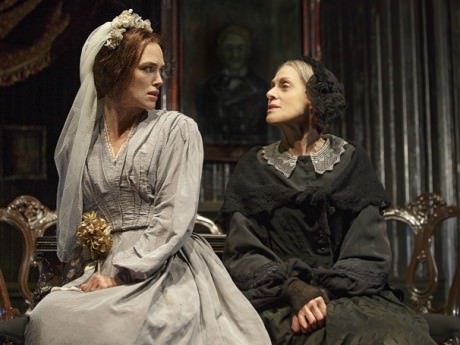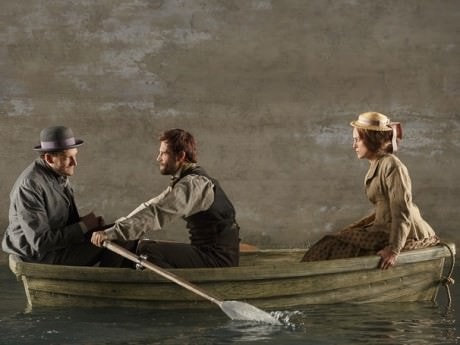Young Therese Raquin is in terrible trouble. We realize this the moment the curtain rises revealing a small and desolate village on the Seine in the year 1868. The entrance of Therese, (Keira Knightley) moments later is lit in wintry shadows which means no entrance applause to welcome this lovely film actress to her debut on the New York stage. A mood has been created by the director Even Cabnet and the brilliant designer Beowolf Boritt that doesn’t permit it. We meet her mother Madam Raquin (Judith Light) and her cousin Camille, but we learn early on that Madam had raised Therese as her own when Madam’s brother had left the little girl with her some twenty years earlier, then disappeared without a trace. Therese, whose birth mother had died when she was two, is a Cinderella of her time, except Madam, though demanding and something of a control freak, is not cruel. It’s her fondest dream that, now that Therese has turned 21, she will marry her son Camille, and Therese, with no other options likely to present themselves, agrees. Camille is something of a loser, but his mother adores him, wants the best for him, and loves the fact that the two who are closest to her will now be united and living under her own roof.

As adapted by Helen Edmundson from the Emile Zola novel, social life for the Raquins consists mainly of a weekly gathering of friends for a rousing game of dominoes. Therese rarely plays with them, but she is always present and is helpful in preparing snacks and serving them. One night Camille brings home a colleague from his job with the railroad, a young man named Laurent, a likely lad who is on his own since his father disowned him because he’d turned his back on the family farm, refusing to carry on and work there. He plans to move to Paris where there should be opportunity for a young man, even though his education and background do not make him ideal employment material.
The richly plotted novel by Emile Zola was published in 1867 and it’s served as the source of another play and several films. Dealing as it does with a married woman’s tempestuous adulterous affair, it’s been borrowed from in films like Double Indemnity and plays like The Glass Menagerie in which Tennessee Williams made use of his hero’s fellow worker acting as a catalyst that changes the plot’s direction. Marriage, lust, infidelity, murder and resultant guilt and remorse continue to nourish this dark tale of a family torn asunder by the exploration of the more primitive needs of its title character and the man who unpredictably enters her life.
In today’s world, more attuned to the darker side of human behavior, all the passion that drives these characters might seem old fashioned and anachronistic, but this production plays them with such commitment that we are absorbed into the play, involved and interested. The physical production from the Roundabout Company, designed by Beowolf Boritt, is so spectacular that it places us at once in another time, another place. There is melodrama in the setting, but there is also romance, and the complex characters that inhabit its world are played by a company of accomplished actors who have fully committed themselves to giving them flesh and blood.
Therese is played by Keira Knightley, and she has transformed herself from a lovely young film star into a tightly wound young matron, old before her time, a woman so self-contained that she cannot enjoy any aspect of her life. Orphaned at two, abandoned by her father, raised by an aunt who has spent most of her largesse on her inferior son Camille, there is no color in Therese’s life and when she stumbles upon Laurent who appears unexpectedly for dinner one night, her containment is abandoned and she opens like a rose in sunlight.
Her joy is infinite, as it is for Laurent, but there is no way out for them as long as she is married to Camille. Knowing it would bring outrage and shame for her to leave him, she and Laurent seek any way possible that will allow them to be together. The moment arrives when a decision that will change their destinies is forced upon them, and we watch grimly fascinated by the course that will take them to the end.
Ms. Knightley, when needed, is magnificently strong willed and decisive. She listens well and uses her body language for expression even when there are no words to express for her. Her vis-a-vis Laurent, as played by Matt Ryan, is equally at ease as a coiled spring of a man, charming and affable when not threatened, resolute enough to kill for a chance at happiness, a man with enough reserve strength to use everything available to him in his fight for a life with his beloved. I won’t spoil the ending for you, but know that the character and the man playing him, are convincing and effective in the choice he makes.
Judith Light and Gabriel Ebert are absolutely right as Madam Raquin and her son Camille. If one thinks back to the early days of her career, she played boss lady to house man Tony Danza for five years on Who’s The Boss? In recent seasons she’s had wonderful roles in Other Desert Cities, Lombardi and other plays, each played with distinction. Now here she is, transformed once again, this time into a widowed mother who spends all her emotional currency on overly protecting her not very bright son, who accepts her offerings without question. He certainly is not husband material, but to please Mother he agrees to wed controllable Therese.

Gabriel Ebert has found a way to make Camille totally believable even though he fails at almost everything. He’s even dense enough not to sense the bond between Therese and Laurent even though it’s being lived out right in front of him. When Mama learns of it, the results are devastating, and Judith Light continues to contribute to the suspense and tension in the play to the end, despite the severe handicaps with which she continues to live.
In further support, Mary Wiseman, David Patrick Kelly, and Jeff Still play friends and relatives colorfully and with great gusto. The full company scenes around the dinner and domino table are richly detailed and one can see that perhaps in another time, when repression gave way to discussion and therapy, the prognosis for this family might have been a little more positive. As it is written, played and directed, this look at several particular lives in the Europe of the 1860s is believable, vivid and most welcome.
Running Time: Two hours and 30 minute, including an intermission.
Thérèse Raquin is playing at Studio 54 – 254 West 54th Street, in New York City. For tickets, visit the box office, call (212) 719-1300, or purchase them online.





